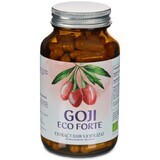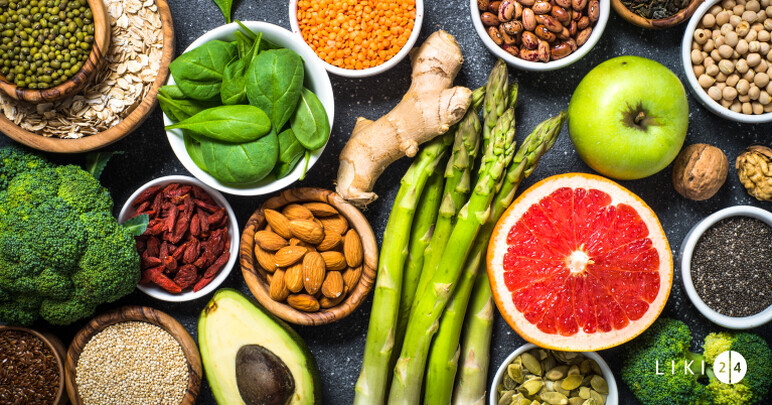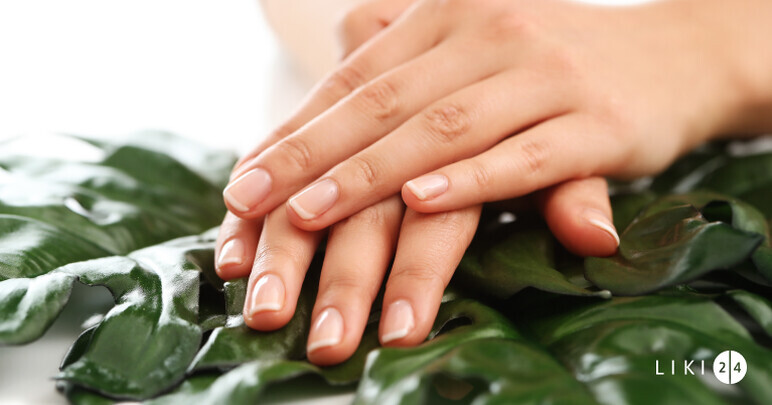Purella Superfoods Goji berries, dried fruit, XL, 100 g
Goji



Goji Eco Forte freeze-dried raw extract, 120 capsules, Aronia Charlottenburg
- 1
- 2

Basic principles of healthy digestion: what helps keep your stomach healthy

Description Goji
The information in the FAQ section was created by the Liki24.co.uk team and is based on the official manufacturer's manual
Goji is a superfood of Asian origin, nicknamed the "fruit of longevity" or "fruit of happiness" due to its remarkable content of antioxidants, vitamins, minerals, amino acids, and bioactive polysaccharides. Used for thousands of years in traditional Chinese medicine, this small red-orange fruit, obtained from the Lycium barbarum plant, has captured the attention of modern science for its immunostimulant, energizing, and anti-aging properties.
Forms of release
Goji berries are available in various forms, tailored to consumer preferences and intended use:
- Dried goji berries – the most commonly sold form; they can be eaten as is or rehydrated.
- Concentrated juice – rich in antioxidants, administered as a general tonic.
- Powder – obtained by freeze-drying, ideal for smoothies and drinks.
- Liquid extracts or capsules – used as dietary supplements for more intense therapeutic effects.
- Teas – made from dried fruits and/or leaves.
- Cosmetics – creams and masks with goji extract for external use.
Indications for use
Consuming goji berries is recommended in the following situations:
- Support for the immune system during periods of stress, intellectual effort, or recurrent infections.
- Adjuvant in weight loss treatments, due to its satiating effect and ability to regulate blood sugar.
- Antioxidant supplement in the prevention of premature aging, cardiovascular and degenerative diseases.
- General tonic for convalescents or people with chronic fatigue syndrome.
- Supports visual health (contains zeaxanthin and beta-carotene).
- Beneficial in mild liver and kidney disorders, as a detoxifying tonic.
Dosage
Dosages may vary depending on the form of administration and the age of the user:
- Dried fruit: 20–30 g/day for adults (approximately one handful).
- Goji juice: 20 ml, 1–2 times/day, plain or diluted in water.
- Powder or capsules: according to the instructions on the package, usually 500–1000 mg/day.
- Goji tea: 2 teaspoons of dried fruit infused in 150 ml of boiling water for 10 minutes. Both the liquid and the fruit can be consumed.
- Cosmetic use: freshly prepared goji face mask 1–2 times per week.
Contraindications
Consuming goji berries may be contraindicated in some situations:
- Known allergy to fruits of the Solanaceae family (e.g., tomatoes, eggplants).
- Hypersensitivity to any of the compounds in goji berries.
Consuming goji berries while breastfeeding or pregnant is not recommended without a doctor's approval.
Caution is advised in patients with kidney stones (high concentrations of oxalates and calcium).
Special considerations
Goji is a functional food that can be easily integrated into modern diets. When rehydrated, the fruits become easier to digest and more versatile in recipes.
They can be consumed with dairy products, whole grains, vegetables, or fruits, as a snack or in salads and desserts.
Side effects
In general, goji berries are well tolerated. Adverse effects are rare and usually occur in the context of excessive consumption or in the case of pre-existing medical conditions:
- Mild digestive disorders (bloating, nausea, diarrhea).
- Skin allergic reactions (itching, erythema).
- Interference with blood sugar or blood pressure levels in people undergoing treatment.
Interactions with other medications and foods
Goji berries may interact with certain medications such as:
- Oral anticoagulants (warfarin) – may enhance their effect and increase the risk of bleeding.
- Oral antidiabetics – may amplify the hypoglycemic effect.
- Antihypertensives – may increase the decrease in blood pressure.
It is recommended that people undergoing chronic treatment consult their doctor before introducing goji berries into their diet.
Overdose
No serious cases of goji berry overdose have been reported. However, excessive consumption may cause unpleasant symptoms, such as digestive disorders (especially if more than 50 g/day of dried goji berries are consumed).
If you experience any unusual symptoms, it is recommended that you stop consumption and consult a specialist.
Storage
Dried fruit should be stored in tightly closed containers, away from direct light, moisture, and heat. Goji juice should be stored in the refrigerator after opening. Powder or capsules should be stored at room temperature in their original packaging.
Specialized literature used
FREQUENTLY ASKED QUESTIONS
Can eating dried goji berries help with weight loss?
Eating dried goji berries can support weight loss due to their high fiber content, which induces satiety and reduces appetite, especially for sweets. They also have a low glycemic index and provide energy without causing sudden fluctuations in blood sugar.
Are goji berries safe for children?
Goji berries are generally safe for children when consumed in moderate amounts. It is recommended to introduce them gradually into the diet, with a serving of 5–10 g/day, and to monitor for any digestive or allergic reactions.
Is it necessary to rehydrate dried fruit before consumption?
It is not necessary to rehydrate dried goji berries before consumption; they can be eaten as they are, as a healthy snack. However, rehydration makes them easier to digest and improves their texture, especially when used in recipes or drinks.
Features
Reviews
Average rating %s based on %s reviews

Slimming tea with Goji Berry, 20 sachets, Solaris
EXCELLENT PRODUCT FOR MAINTAINING WEIGHT

Slimming tea with Goji Berry, 20 sachets, Solaris
EXCELLENT PRODUCT FOR MAINTAINING WEIGHT



































































